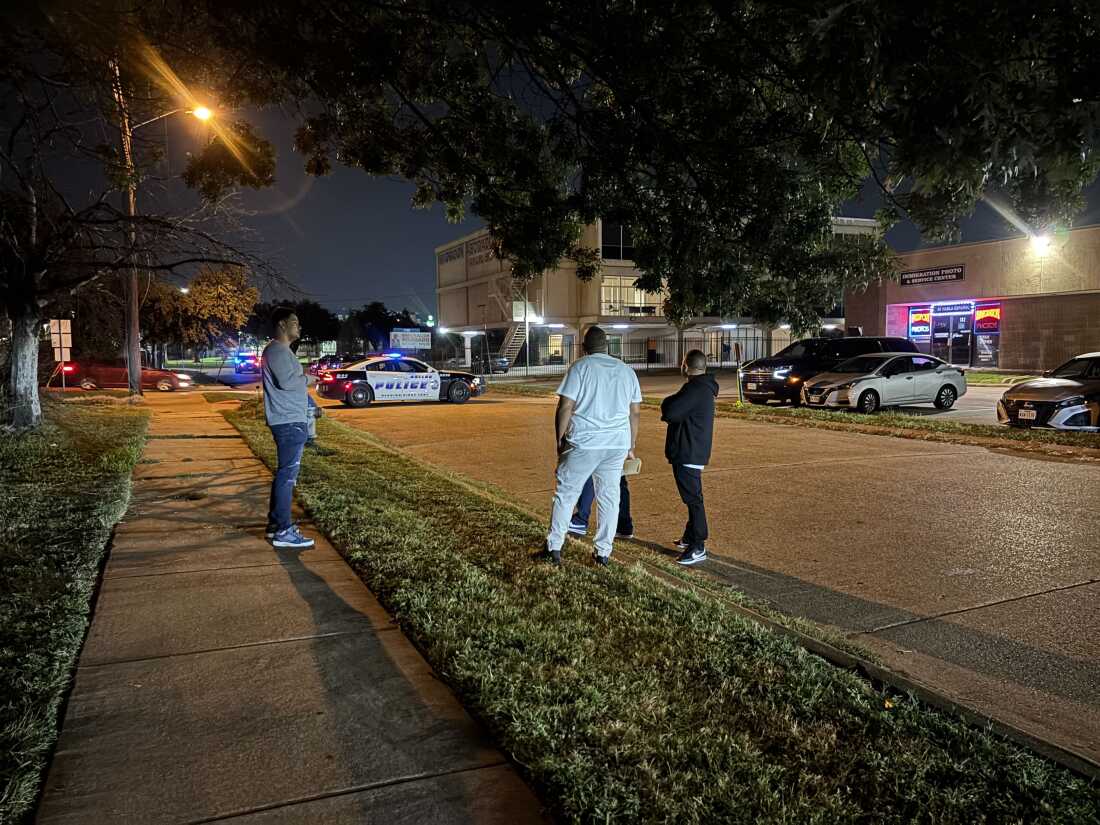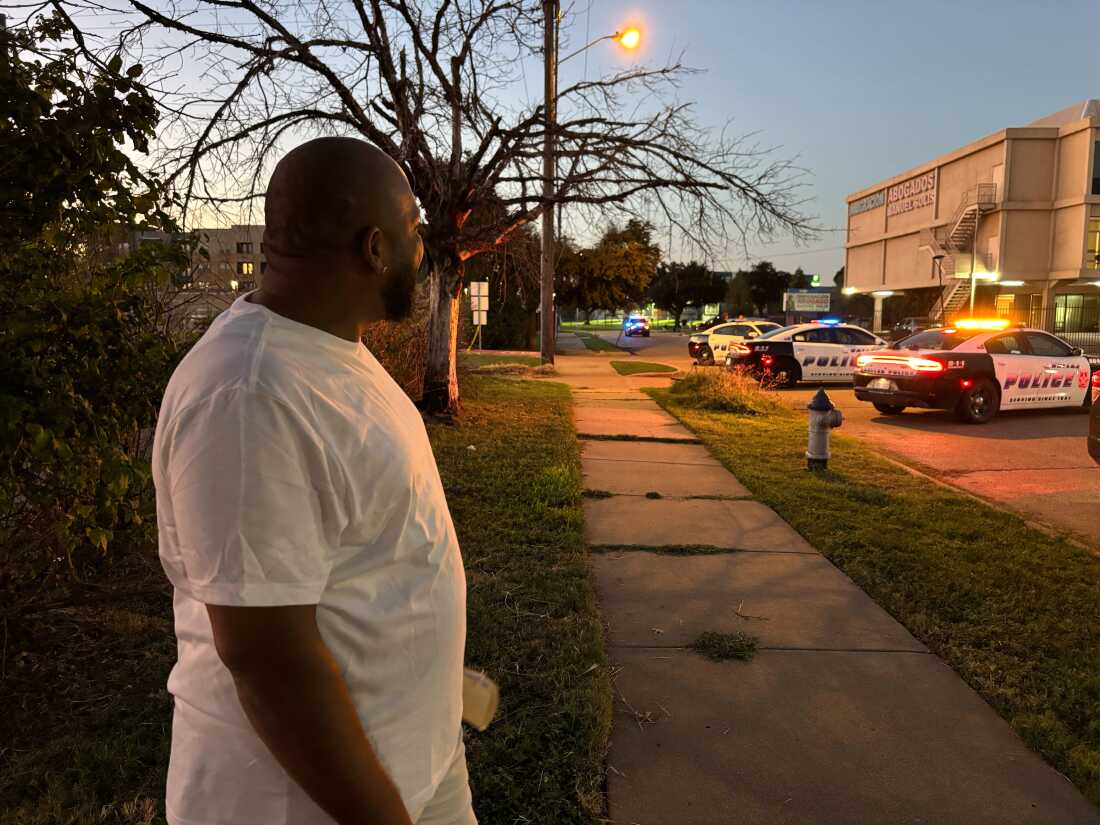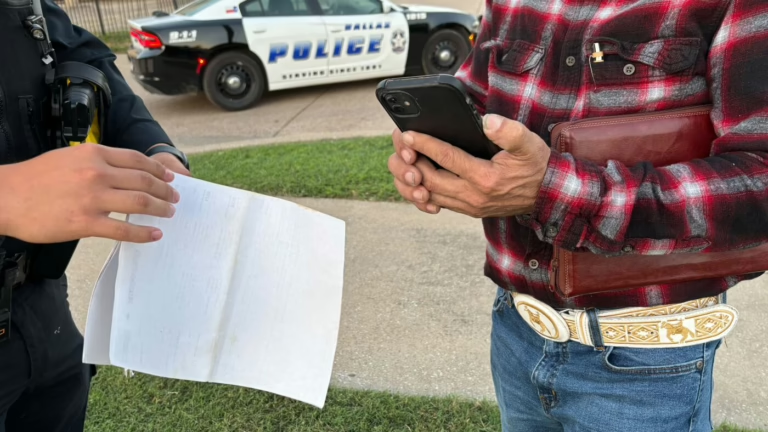Authorities confirm the U.S. Immigration and Customs Enforcement (ICE) office in Dallas remains an active crime scene. Despite this, individuals with mandatory ICE appointments arrived as scheduled, only to be denied entry.
Sergio Martínez-Beltrán/NPR
toggle caption
Sergio Martínez-Beltrán/NPR
Before dawn broke, a Colombian immigrant identified only as A. parked his vehicle in a vacant lot adjacent to the Dallas field office of U.S. Immigration and Customs Enforcement (ICE).
Due to concerns about jeopardizing his ongoing immigration proceedings, A. requested anonymity. It was approximately 5:45 a.m. on Thursday, nearly 24 hours after a gunman fired from a nearby rooftop at the facility, resulting in the death of one detainee and injuries to two others. While the shooter’s motives remain uncertain, officials from the Trump administration and the FBI have described the incident as a deliberate attack targeting immigration enforcement personnel.
A. had been traveling from his home in Los Angeles to Dallas when the shooting occurred. Despite the incident, he arrived early the following day for his scheduled check-in, unaware that the appointment had been postponed. Concerned about potential repercussions, he expressed fear of facing deportation for missing the meeting.
“I’m abiding by the law,” A. explained. “I’m worried this situation might lead to a deportation order against me.”

Missing a required ICE appointment can heighten the chances of detention or deportation. Many migrants arrived before sunrise, unaware that their appointments had been canceled or rescheduled.
Sergio Martínez-Beltrán/NPR
toggle caption
Sergio Martínez-Beltrán/NPR
Marcos, a Venezuelan immigrant who also requested to be identified only by his first name due to his pending immigration status, arrived early to attend his check-in. Although he had heard about the shooting, he was unaware that the facility had been closed since the attack.
He shared that he had not received any official communication from the government regarding the closure until Monday.
“I’m uncertain about what to do,” Marcos admitted. “Will ICE mark me as absent, or will they understand since the office was closed?”
ICE did not respond to inquiries about how missed appointments under these circumstances would be handled.
Failing to attend a scheduled ICE check-in can lead to increased risks of detention or deportation orders.
As daylight spread on Thursday, a growing number of immigrants arrived at the site carrying their documentation.
No immigration officers were visible at the location, and the only official presence came from Dallas Police Department personnel managing the perimeter and directing those seeking entry.
Among the officers, only one spoke Spanish-the predominant language among the migrants present. Despite his efforts to advise individuals to contact their lawyers or call the ICE facility’s phone number, he was soon inundated with questions.
“I came for my appointment because I want to follow the law,” said Benjamin Bellorin, a 53-year-old migrant from Nicaragua, speaking in Spanish to the officer. “I’m scared.”
Bellorin had driven over two hours from Breckenridge, Texas, to attend his scheduled check-in.

Marcos, who requested anonymity due to his immigration case, expressed concern that ICE might not excuse his absence despite the facility’s closure and ongoing investigation.
Sergio Martínez-Beltrán/NPR
toggle caption
Sergio Martínez-Beltrán/NPR
“I’m sorry you had to travel so far,” the officer told Bellorin. “But unfortunately, no one is allowed inside.”
Bellorin admitted he was unsure whom to contact since he cannot read.
“Let me try to make a call,” the officer offered. “My spouse is an immigration lawyer and might have a contact number for you.”
After a brief absence, the officer returned with an email address for ICE and advised Bellorin to seek assistance in sending a message.
“I heard you should come back on Monday,” the officer added.
“I just want them to know I showed up,” Bellorin responded.

















